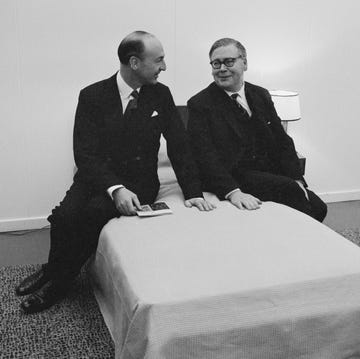I don't know if you've noticed but everyone's got a bit shouty recently, whether its global politics, your Twitter feed or what was meant to be a quick drink after work.
There's few things more tiresome that being confronted by someone who insists on debating the relative merits of Jeremy Corbyn / Donald Trump after five craft ales, but if you are faced with a combative situation, it's good to know how to handle yourself.
Enter: psychology, and the easy tricks that can help you walk away the winner.
Try the 'socratic method'
A technique that sounds more intimidating than it really is, the socratic method means questioning people in order to think critically about different view points. Still sound complicated? Say your partner is rather irked you didn't make it home for dinner and you crawl in drunk at 2am. Rather than engaging in a yelling match where you deny all accusations levelled at you, instead ask questions like, "how does that make you feel?", "what would you rather I did?"
This works on two levels. Firstly you let your partner express how they feel, which means they're releasing resentment rather than bottling it up. Secondly it shows that you're listening and bothered about how someone else feels making them feel considered. Try it, just don't overdo it to avoid that 6-year-old-on-a-long-journey vibe.
Use positive words
Often during a tiff the red mist takes over and our language becomes more emphatic. However, stating arguments in any overly forthright and resolute manner can in fact weaken your position in other people's eyes rather than convincing them of your viewpoint.
Research by PhD students at Cornell University analysed two years of posts on the SubReddit ChangeMyView, a forum where people submit arguments to, well, change someone's view.
Results of the study concluded that, "People who post more calm and positive words, such as 'help' and 'please' are more malleable. This is true if they post more adjectives. Stubborn people use more emotive and decisive words including 'certain', 'nothing' and 'best.'"
This even went as far as people being switched off by harsh sounding words: "Using 'calm' language to make a point is more effective than swearing or using aggressive terms. In the paper, examples of 'calm' words include those that are softer-sounding such as 'librarian' and 'dull' than harsh, 'sharp' words such as 'terrorism' and 'erection.'"
So no talk of erections, ok?
And remember, as Caitlin Moran wrote in an essay about winning online arguments, "If a conversation starts angry, it will almost certainly continue angry, and end up apoplectic."
Exaggerate your opponents position
According to Arthur Schopenhauer, author of The Art of Being Right, one way to reduce the effectiveness of your partners argument is to carry their position beyond what they're saying and broaden their position.
"The more general your opponent's statement becomes," he says, "the more objections you can find against it.The more restricted and narrow your own propositions remain, the easier they are to defend."
This means you can take their argument way beyond the intended point and then demonstrate how ridiculous and unreasonable the exaggerated position is. For example if someone argued that eating meat damaged the environment you could then point out that even things like flushing the toilet and taking public transport harm the environment.
Check your threatening body language
You might think that intensely staring someone out is a way to show someone you mean business but a recent paper published by University of British Columbia argues that eye contact increases resistance to persuasion. The study concluded that:
"Intentionally maintaining direct eye contact led to less persuasion than did gazing at the mouth. These findings suggest that efforts at increasing eye contact may be counterproductive across a variety of persuasion contexts."
Body language expert Jennifer Rigdon has listed other gestures to avoid. "Sit or stand in a way that is similar to whomever you are speaking with, this will make you appear open and non-threatening. But be sure not to hold anything in your hands. Holding a phone, or even a pen, could make you appear closed off."
Use the anchoring effect
According to lawyer John Curtis, the anchoring effect means that "Frequently in negotiations, the party that makes the first move – whether a suggestion for a solution or an offer – comes out ahead. That is, the resolution ends up being closer to their original position. Why? Because they've set the anchor point for the conversation."
Multiple studies have found that initial offers have a stronger influence on the outcome of negotiations than subsequent counteroffers. So, if you're arguing over something you specifically want say it first and jump in deep with what you want rather than coming around to it slowly.














